Introduction:
Companies having an establishment in China are exiting from past 2 years (i.e., even before Covid-19 pandemic has started & trade war with US) but notable companies were exiting China after trade war with US & starting of Covid-19 Pandemic. In a study, it was found that if supply of goods from China decreases, this will have an impact on their currency & economy. China will then depreciate its currency which makes Chinese products cheaper and preferable to buy. So, even companies moving from China to India may not have a major beneficial impact on the country’s economy. In this article, we will be focusing on why companies exiting china are preferring Vietnam over India. Below image shows list of companies exiting China:
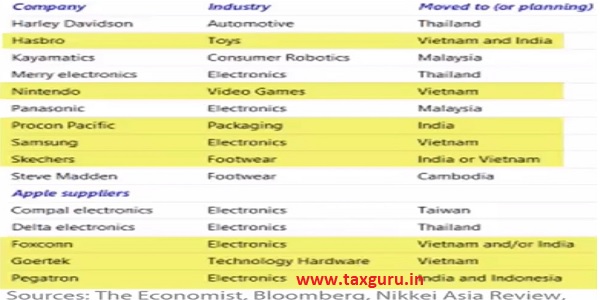
A study in 2018 lists out the list of countries along with the index as to where the companies exiting China will be willing to move:

India is offering benefits even in this pandemic situation to foreign companies to come to India for starting their business like double the land than they required for doing business and free electricity & water supply etc. for attracting new companies. But majority of the companies exiting China are preferring Vietnam (which is 1/10th of India in terms of area) over India for following reasons as explained below:
Reasons for choosing Vietnam over India (Associated with PESTLE Analysis):
Companies will perform PESTLE Analysis primarily to check best country / place for starting business / shifting their business. Companies exiting china finds Vietnam better when compared with India in following comparables (which can be formally categorized in performing PESTLE Analysis):
a. Political Factors:
Political factors refer to type of country and Stability of Government & its policies, incentives and subsidies by the Government.
India is the most populous democracy in in the world whereas Vietnam is a Socialist Republic country. In a country like India, Government will be elected by people for a period as specified by respective country’s constitution and stability of the Government Cannot be guaranteed. Change of Government may have an implication on Govt policies prevailing in the country.
A live example for the same can be Change of Capital by the State of Andhra Pradesh. In the year 2014, Ruling party announced Amaravati as capital of Andhra Pradesh and has done Land Pooling Scheme and made various proposals to MNCs to make investments in the state. But change of Ruling Party in the year 2019 has led to change in above decision which led to majority of the MNCs exiting from the State. [This scenario is taken just for providing live example as to how change of ruling party can led to change of Government policy and is not intended to favor / oppose any political party or policy of the Government]
Following indexes of the year 2018 evidences that Vietnam has better Political Stability and less restrictions in FDI Regulations when compared to India:
| Particulars | India | Vietnam |
| Political Stability Index | -0.93 | 0.2 |
| FDI Regulatory Restrictiveness Index | 0.209 | 0.13 |
India ranked 165 & Vietnam ranked 84 of 195 countries in total in terms of political stability. These indicators evidence that Vietnam is in better Political position & FDI regulations than India.
b. Economic Factors:
GDP, Interest Rates, Inflation & Unemployment etc. are economic factors in PESTLE analysis. Infrastructural Developments in Vietnam are ahead of India. Following factors & indices evidences economic status of both the countries:
| Particulars | India | Vietnam | Year |
| Inflation Rate | 5.84 | 3.17 | 2020 |
| Corporate Tax Rate | 25.17 | 20 | 2020 |
| GDP Per-capita | 2010$ | 2525$ | 2018 |
| Debt / GDP % | 68.05 | 58.22 | 2018 |
| Unemployment Rate | 8.5% | 2.2% | 2020 |
| Currency Fluctuation Rate | 42.64% | 19.49% | 10 Years |
* High inflation rate refers to a risky situation and is prevalent among underdeveloped countries. High Inflation rate may have a negative impact on the entity since it may cause increase in the raw material price & other costs.
* Companies always prefer companies with low corporate tax rate since the tax expense will be low and companies can get high free cashflows when compared with others.
* High GDP Per-capita & Low Debt / GDP% are good indicators. India is having high GDP Per-capita and Vietnam is having low Debt / GDP%. High Debt / GDP% may lead a situation where a country can fall into a situation of overdependence on another country (since World Bank & Other International Financial Institutions cannot give funds to meet entire financial needs of the country). Overdependence on other country may lead to dominance of the other country in future [Live example can be China making huge investments in Pakistan & other under-developed African countries for long term benefits]
* In countries with high unemployment rate, skilled manpower will be available at cheap price when compared to other countries. India is in beneficial position in this comparable since labor can be employed in India at low price.
* Companies prefer countries with low currency fluctuation rate to avoid currency risk. Below image explains volatility rate of past 10 years of both the currencies. Vietnamese Dong is a ‘crawling peg’ currency i.e., fluctuation of currency will be within the fixed limits (pegged to US Dollar) whereas Indian Rupee is a ‘free floating currency’. Hence the fluctuation rate in last 10 years in India is 2.5 times when compared to Vietnam.
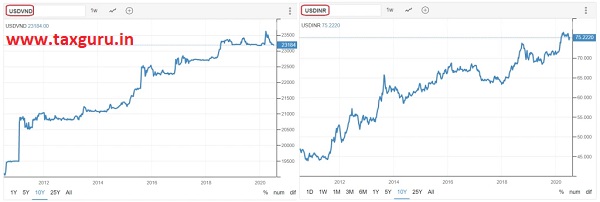
* Port Infrastructure – Number of major ports in India (12) is more when compared with Vietnam (7) and annual port handling capacity of India is thrice than that of Vietnam since costal line is more in India.
c. Social Factors:
Location of country and Demographics of the country like average age of the population, division of population in terms of region, religion, sex & cultural barriers etc. Countries prefer countries without any social barriers among the people of the country.
* One of the major reasons why companies are choosing Vietnam is the area in which it is located. Vietnam is the nearest country to the Chinese Manufacturing Hub – Shenzhen. Below map confirms the same. Countries moving from china will not move 100% of their capacity from China since it is costly & also time consuming. So, movement of raw materials from Shenzhen will cost more if the distance between both the plants are more.

* Vietnam has a large manufacturing hub which offers synergy to companies proposed to come to Vietnam unlike India where plants of companies are in different parts of the country to support overall development of the country
* Vietnam is ahead of India in initiatives related to education. It started compulsory education 8 years ahead of India and spends more amount than India when compared as a percentage of respective country’s GDP. Below image provides exact data supporting above information:
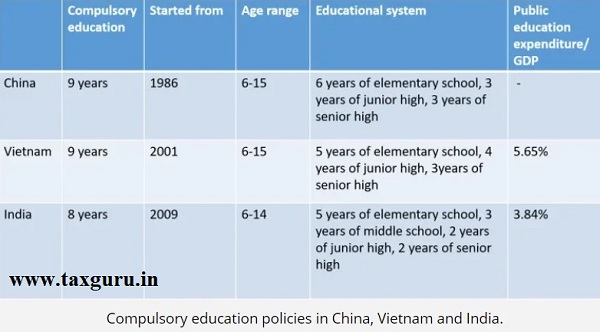
Following factors & indices compares both the countries in factors of social comparables:
| Particulars | India | Vietnam | Year |
| Human Capital Ranking | 103 | 64 | 2017 |
| Labour Force Participation Rate | 49.8 | 76.6 | 2018 |
| Workplace equality | 62.6 | 71.4 | 2018 |
* Gender inequality is prevalent more in India when compared to Vietnam. Though percentage of women completing their education is increasing, percentage of women job holders is not increasing at par since it is a customary practice in India that a man should earn money for home and a woman should take care of house. Labor force participation rate of both the countries along with the China is shown below:
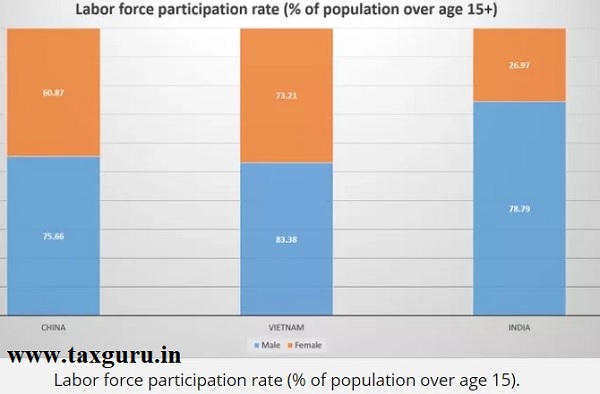
d. Technological Factors:
Level of technology, automation and incentives for inventing new products etc. comes under technological factors. Though India is one of the fastest growing technological hubs, is lacking behind Vietnam in terms of Innovation. A research conducted in the year 2018 states that Vietnam (Ranked 45) is advanced than India (Ranked 57) in terms of Innovation.
e. Legal Factors:
Prevalent laws for conducting business in the country will come under this. List includes employment law, Labor welfare and health, Corporate Laws & Level of corruption in the country etc. For starting a business in India, 12 procedures are required to be followed which will take 27 days on an average, whereas only 8 procedures are required to be followed in Vietnam which will make it easy to start a business there. Employment Laws & Labor Unions in India are also not as strict in India owing to high rate of corruption and other reasons.
A live example w.r.t. safety laws and strictness in implementation can be the following incident happened in United States – “Swedish furniture giant, Ikea has agreed to pay $46 million to the parents of a child who was killed when a chest of drawers fell on him. The two-year-old Jozef Dudek, 2, suffocated to death in May 2017 when the company”s Malm drawers toppled over at the family’s California home, the BBC said in a report.”
f. Environmental Factors:
Climate change and Average Temperature are very important for companies engaged in data and cloud storage centers since cost of cooling the storage space will be more in countries like India and Vietnam. These kinds of companies may move to European countries where the temperature will be very low.
Prevailing environmental laws and power of NGOs and Government Policies in this regard will come under this wing.
As per Environmental Performance Index Ranking in 2018, which ranks various nations based on Environmental Health and Ecosystem Vitality, Both India & Vietnam were not taking suitable steps towards maintaining sustainable environment. India and Vietnam ranked 177 and 132 among 180 countries.
Reasons for choosing Vietnam over India (Other than PESTLE Analysis):
a. Similarity in exports:
When a company having well-established manufacturing facilities is planning to shift another country, it will consider availability of resources and similarity between both the countries to ensure similar business environment. Below image states list of various countries with their similarity in exports when compared to China:
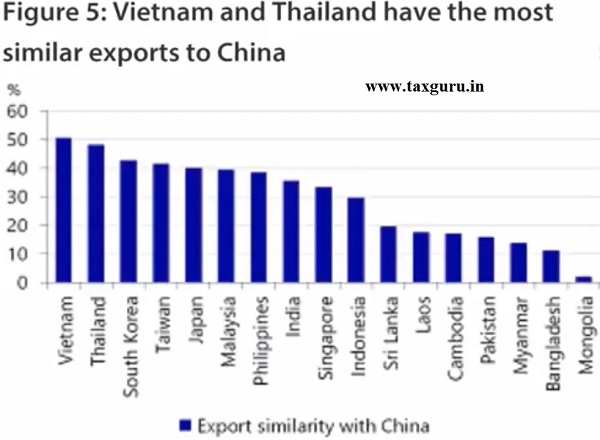
Above image confirms that Vietnam & Thailand are having similar exports with China which will bring similar business environment to the company
b. Free Trade Agreement & Status given by other countries:
* Vietnam has Free Trade Agreement with South East Asian countries like China, Japan etc. which reduces the trade barriers and encourages international trade.
* United States gave Most Favored Nation Status to Vietnam which makes easy for Vietnam to sell its products in US without any restriction.
* Vietnam is a member of Association of Southeast Asian Nations (ASEAN) which promotes intergovernmental cooperation and facilitates economic, political, security, military, educational, and sociocultural integration among its members and other countries in Asia. India is a member of ASEAN Plus Three and does not have above benefits
c. Relationship with China:
At the outset, it may find a negative aspect to have a good relation with China but Vietnam will have following advantages:
* Since Vietnam is having proximity with China, Manufacturing process can be smoothly routed through china
* If the company wishes to continue, China can remain as raw material supplier
* If India / United States / European Union puts restriction on trade with China, China can still export via Vietnam which ensures good relations with China
d. Ease of Doing Business Ranking:
Global rank on ease of doing business along with other parameters are tabulated below:
| Parameter | India | Vietnam |
| Ease of Doing Business | 63 | 70 |
| Starting a Business | 136 | 115 |
| Dealing with Construction Permits | 27 | 25 |
| Getting Electricity | 22 | 27 |
| Registering Property | 154 | 64 |
| Getting Credit | 25 | 25 |
| Protecting Minority Investors | 13 | 97 |
| Paying Taxes | 115 | 109 |
| Trading across Borders | 68 | 104 |
| Enforcing Contracts | 163 | 68 |
| Resolving Insolvency | 52 | 122 |
Conclusion:
This article does not discriminate any country either directly or indirectly. It compares both India & Vietnam in various parameters which companies exiting china might have in deciding country in which they should operate their business.
****
Disclaimer: The contents of this article are for information purposes only and do not constitute an advice or a legal opinion and are personal views of the author. It is based upon relevant law and/or facts available at that point of time and prepared with due accuracy & reliability. Readers are requested to check and refer relevant provisions of statute, latest judicial pronouncements, circulars, clarifications etc before acting on the basis of the above write up. The possibility of other views on the subject matter cannot be ruled out. By the use of the said information, you agree that Author / TaxGuru is not responsible or liable in any manner for the authenticity, accuracy, completeness, errors or any kind of omissions in this piece of information for any action taken thereof. This is not any kind of advertisement or solicitation of work by a professional.





Calling political stability as positive in Vietnam over Indian negative is highly exaggerated. Please compare Hongkong with India. The writers can criticize 24 hours/ 365 days about India but let me know the names of ruling or opposition paty in Vietnam. Like China it offers blindly anything for industries. What happens if USA behaves like it did with China? Lever Brothers now known as Hindustan Unilever or Colgate Polmolive or Nestle have gained immense ly since locals even during Pandemic grabbed all items produced by them. Time will tell. India has a broad base, democracy, educated/rural or huge urban customers which will help any industry.
However I appreciate the writer for his scholarly article.